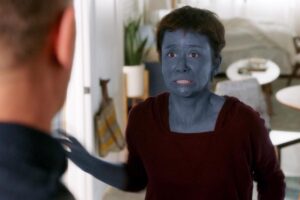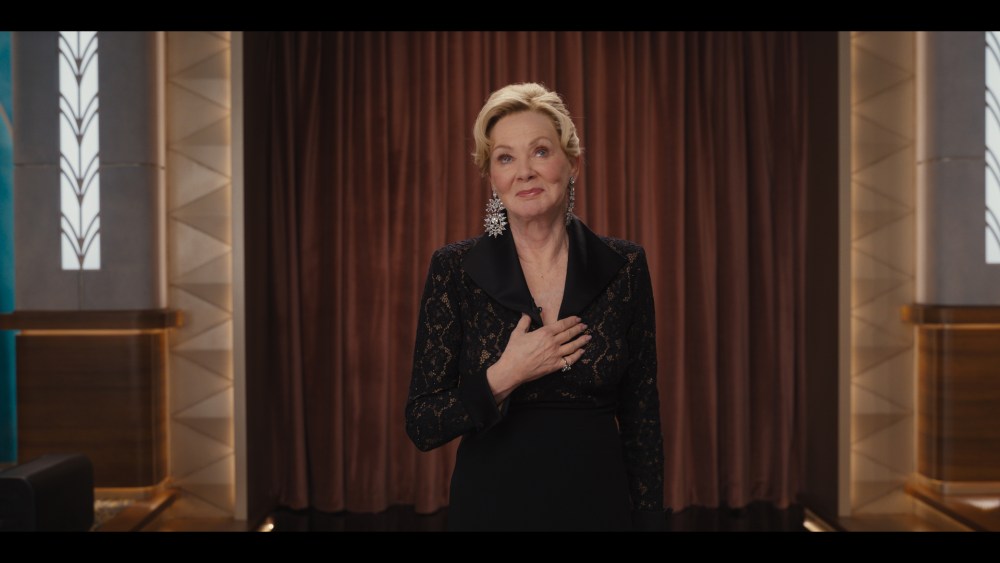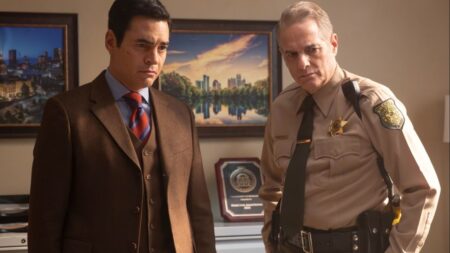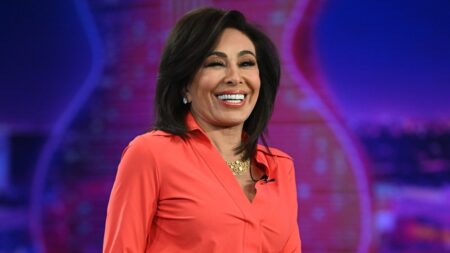“How about you not think of me as a woman, OK?” Deborah Vance tells a group of journalists in the first episode of the fourth season of “Hacks,” as they interrogate her about her pathbreaking role as the first female late-night host. “I’m not a woman — I’m a comedian.”
Jean Smart’s multiple-Emmy-winning performance has by now proven that Deborah believes what she’s saying — that as a boomer comic who’s had to fight to occupy space, she identifies by job title first, gender second. And yet as the season has continued, it has made the case that Deborah being a woman is both a stumbling block, in that it leads her audience to prejudge her, and a secret strength, in that she bristles against that judgment with brio and a witty rage. In showing Deborah’s journey to the very top of the comedy heap, “Hacks” poses an insistent question: If a rise like hers couldn’t happen in the real world, well, why not?
Up to this point, on Earth-1, a marquee late-night franchise has never been headlined by a woman. (Lilly Singh, on NBC, and Taylor Tomlinson, on CBS, hosted shows that aired after those respective networks’ flagship series, “The Tonight Show” and “The Late Show”; Singh’s was canceled in 2021, and Tomlinson’s just this year after the host decided to leave.) Even in the world of “Hacks,” it was no sure thing — Deborah only got the job after a concerted public pressure campaign that took up all of Season 3, and this season, we learn via network chief Winnie Landell (Helen Hunt) that Deborah got hired as a Hail Mary play. It was an attempt to save late-night TV, as a concept, by casting someone radically unexpected as host. The alternative was shutting it down.
This rings eerily true: Tuned-in viewers will be aware of various cuts; last year, for instance, NBC’s “Tonight Show” joined its counterparts on ABC and CBS in dropping Friday broadcasts, while NBC’s “Late Night” saw its live band fired for budgetary reasons. Deborah — like Singh and Tomlinson, and like any other woman who might someday approach one of the big three current late-night properties — is a victim of the so-called glass cliff. She finally got the big job at the precise moment the prestige and importance of the bigjob slipped away. Her task is to manage the fall.
And she has to do it while being all things to all people — or so she thinks. In the face of pushes by her head writer and millennial-whisperer Ava (Hannah Einbinder) to dig into her particular sensibility, Deborah insists on a broadcast aimed at any potential viewer. Aware of the precarity of her position, she needs to be a pleaser. It’s a fool’s errand: One scene that reveals the perspective of series creators Lucia Aniello, Paul W. Downs and Jen Statsky centers on a focus group evaluating Deborah herself. “You can’t see her legs behind the desk,” says one man, while a woman calls her an “old Lolita” and criticizes her hairstyle for being too short. Another woman says that while Deborah is naturally funny, she comes across as a tryhard when she’s telling jokes.
In other words, in trying to please everybody, she’s pleasing nobody. But she can’t stop herself, converting her chic updo into Rapunzel tresses and her show into a hybrid cooking-lifestyle show because jokes, her stock in trade for her whole career, are just too toxic. She’s now a woman first, and a comedian somewhere less significant.
If it feels like a cynical choice — well, we love Deborah because she’s a cynic. But the question, and the promise, in this season’s remaining episodes is this: Can Deborah actually port the sensibility we know she has into a format dominated by guys named Jimmy? The series’ creators have shown us all the reasons a show like this couldn’t work. What lies ahead, perhaps, is a glimmering moment in which it could — in which Deborah is a woman, and a comedian, at once.
As the first female late-night host, Jean Smart’s Deborah Vance tries to please everyone, but winds up pleasing no one.
Read the full article here








